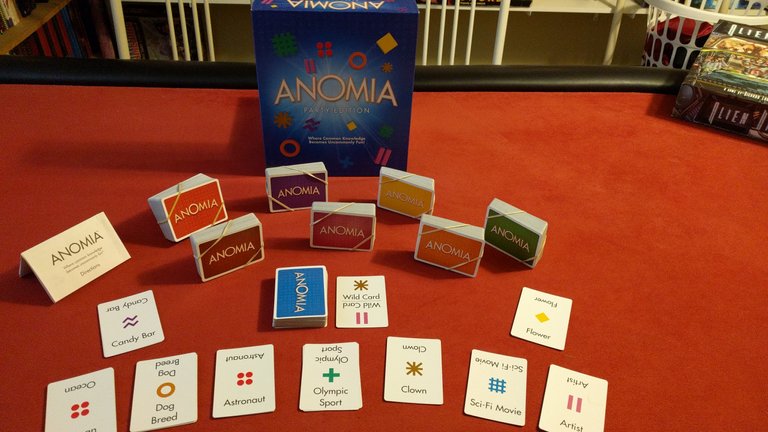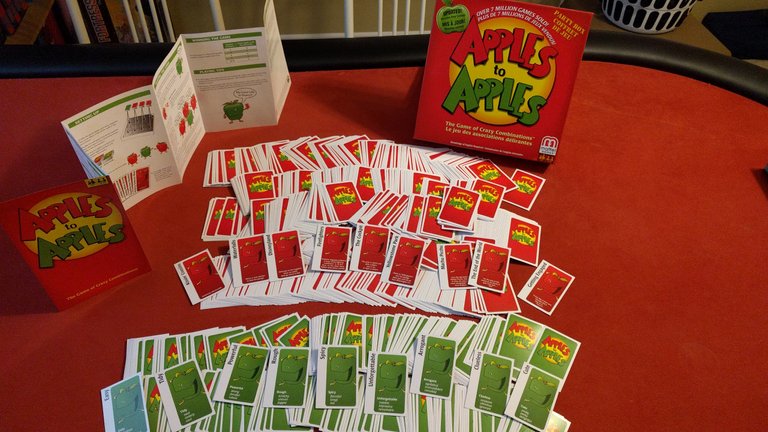They're small, I'll double up today.
What do I think about Anomia?
I have better luck winning against adults, than I do kids. 10+? Depends on the child's vocabulary. This game is fun and quick, if you're not a fast thinker, it's not for you, or expect to lose. Happens to me with children because they seem to know more than me, some adults think a little slower, giving me time to think of something.
I really have nothing much to say about this game. I'll play it when we need something quick or when in between games with more substance. I wouldn't want to play this all night.
"uh-NO-mee-uh - noun - 1) A problem with word finding or recall. 2) Chaos. 3) The game where common knowledge becomes uncommonly fun." -Intro from Rules-
Anomia is a game played with 3-6 players of ages 10+ over (according to the box) a 30 minute game time.
Players sit around a table, the card deck is placed in the middle of the table.
Players will take turn drawing cards and should a card drawn have a like symbol as another card; those 2 players square off to name something of the topic shown on the OTHER (opponent's) card.
Each card in the deck has 1 of 8 symbols with word topic or is a wild card showing two symbols.
A Wild card's double symbol indicates those 2 symbols are interchangeable for guessing.
When players draw cards: they draw cards away from them so that the other players can see the card first; but be quick because you also need to see it.
Round 1
Player A draws an Asterisk with the topic "Ocean"
Player B draws a Diamond with the topic "Country"
Player C draws a Circle with the topic "Madonna Song"
Round 2
Player A draws a Plus with the topic "Soap" and covers "Ocean" blocking the Asterisk
Player B draws an Asterisk with the topic "Bird" and covers "Country" blocking the Diamond
Player C draws a Plus with the topic "Candy" and covers "Madonna Song" blocking the Circle
Players A and C both have the same symbols showing. Player C calls out "Lever 2000" before Player A can name a candy; Player C claims Player A's "Soap" card and places it face down to count for points when the draw deck runs out. This uncovers Player A's Asterisk.
But while Player A is trying to figure out what a candy is, Player B calls out Atlantic and takes Player A's "Ocean" card.
Player A realises they should pay more attention.
When the draw deck runs out, the game is over and players count the number of cards they claimed. Most cards wins.
All ties or close calls are moderated by the draw of another card and first to call out based on its topic, wins the tie.
Expansions: The Party Expansion. This expansion adds 6 more decks to the original 2.

What do I think about Apples to Apples?
It's not a "game for horrible people."
I like it. I'll play this over its adult equivalents, any day. You can even play with those rules. It's almost identical but it's VERY kid friendly and not offensive..unless you're a red or green apple.
Though the game box has no time frame; the game does not seem to drag if it take a while.
Absolute minimum: 4 rounds; Absolute maximum: 40 rounds; however long you take between turns will adjust the length of the game in time.
Age: 12+ I would deem the same as Anomia. Every child is different in their knowledge and some 6 year olds might out-do you.
"Apples to Apples is the wild party game that provides instant fun for four to ten players! Just select a card from your hand that you think is best described by the card played by the judge. If the judge picks your card, you win the round. It's as easy as comparing "apple to apples!"" -Intro from Rules-
The game is played with 4-10 players aged 12+ with no time frame given on the box.
Players pick the first "Judge" and the first judge deals seven (7) red apples (cards) to each player including him/herself.
The judge then draws one (1) green apple (card).
The other players each select a red apple that best defines the green apple and passes them face-down to the judge who shuffles and reveals face up. Each player may make a case for their apple after which the judge then chooses a red apple that best describes the green apple. The winning player gains the green apple as a treasure.
All players who played a red apple draw a new red apple.
The player to the left of the judge becomes the new judge and play proceeds and claims the green apple deck.
Draws one (1) green apple and the remaining players repeat the process.
Depending on the number of players will determine how many green apples are required to win, however, players can choose any number at the beginning of the game.
You also do not have to play a red apple that best fits the green apple; humourous and convenient choices are also made by judges.
